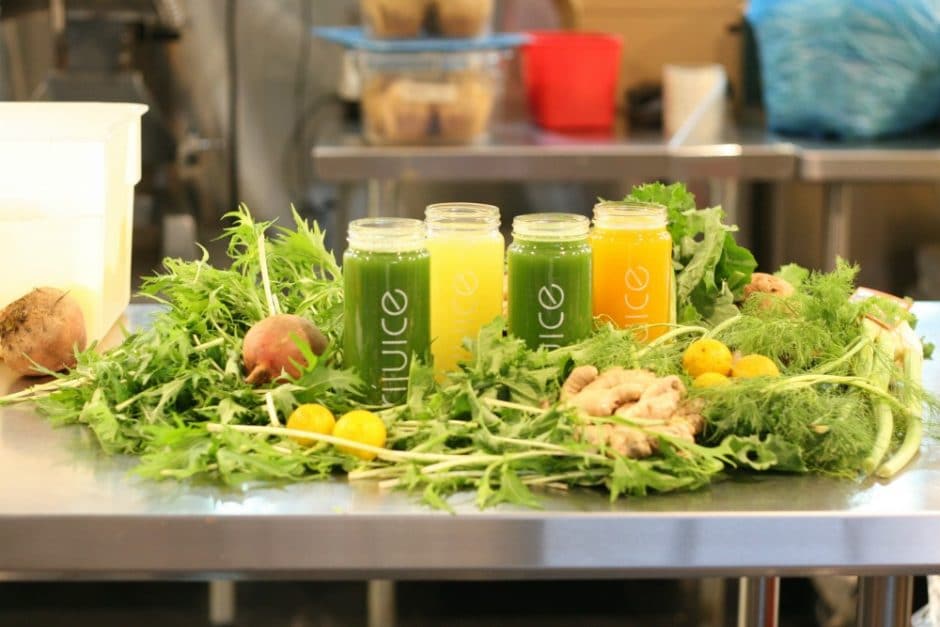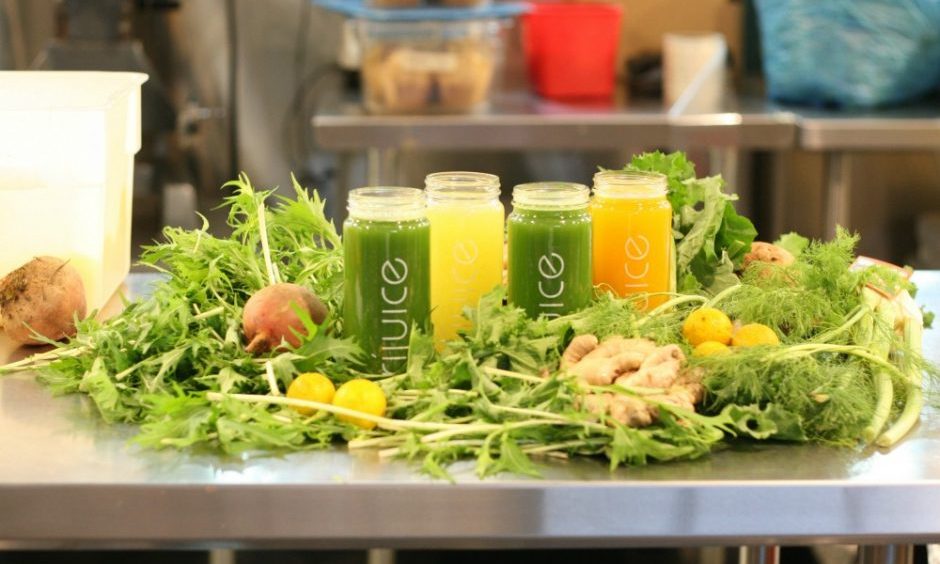
In a freezing-cold industrial kitchen space on a recent morning, several men wearing coats and ski hats under their white coats and masks, are turning large trays of fruits and vegetables — carrots, apples, lemons, kale, celery — into bottles of green, yellow and orange juice.
They’re the guys who run rijuice, a cold-pressed juice company that recently moved into larger quarters off Running Pump Road, which they share with Lancaster Farm Fresh Cooperative. Lancaster Farm Fresh is developing a beverage CSA (community-supported agriculture) share that will help bring rijuice to homes in cities like New York and Washington, D.C.
The rijuice kitchen staff feed the raw, organic produce into a large — and loud — industrial juicer; the pulp is extracted and the pure juice that’s left is bottled on the spot
They’re making six flavors on this day — apple-lemon-ginger, golden beet, kale-spinach-apple-lemon and more.
Rijuice — that’s pronounced “re-juice” — is the brainchild of two college friends, Cullen Farrell and Kyle Ober, with an assist from the guy who comes up with new flavors, Chef Rafaed Pozzi.
The juice, made only with fruits and vegetables — no added water or sugar — is now in stores across the state, along with a stand at Lancaster’s Central Market. The company gets a lot of its produce from area farms; Pozzi, a native of Puerto Rico, gets some produce shipped here fresh from the island for use in the juice, as well.
The company started in the basement of the Tellus360 bar and restaurant, and later moved to a Marion Street facility before moving to its current space Sept. 1.
Ober and Farrell were working at other jobs when they started the juice company; Farrell felt unhealthy with long hours at a desk, and, having started juicing, he wanted to share that with the world. With cooking experience – and, Ober and Farrell say, a great palate – Pozzi was a home juicer who joined the company to create new flavors.
We sat down with Cullen, Ober and Pozzi recently to ask them about their juice products. This interview has been edited for length and clarity.
What is the cold-pressing process?
Ober: It’s a method where as little heat and air is introduced as possible during the pressing cycle. Heat and air cause oxidation, which breaks down the quality of the juice. All the juice is generally grinded up into a pulp, and then it’s pressed at 1,700 pounds per square inch. That slow pressing process creates a really good balance. If you press too hard, with apples for example, you’ll get too many of the negative characteristics of the produce – like the bitterness of the skins.
Pozzi: Some companies use heat to help extract the juice. With heat, that kills certain nutrient
Fresh produce is turned into cold-pressed juice in the rijuice kitchen.
What’s the shelf life of your juice?
Ober: Thirty days. It has to be refrigerated at all times. A good amount of the juice we sell at market is still raw. Every Tuesday we do our wholesale run. All that stuff will get pasteurized with our high-pressure processing. The produce and the liquid and the final produce never goes above 41 degrees.
Pozzi: There’s no heat or any chemicals added (in our pasteurization process).
Ober: Our goal as a company is to provide our customers with the freshest juice possible. We press every single week fresh, and often we get juice to the customers within two to three days of it being made.
What happens to the pulp?
Ober: We’re trying to start a composting program with the farmers, and trying to send all our apple pulp out to pig farms for livestock feed.
Why the name rijuice?
Farrell: All my family is Irish. When we started the company I wanted to tie that into what we were doing. I felt like we were returning to clean eating, from the land; I wanted to tie that into an ancient culture. So I found the word “ri,” which is Gaelic for “king.” It’s like the king of juices. It meant “sun” as well. All the implications were there for what we are doing. We started with glass bottles, so “recycle, reuse, repurpose, revive, rejoice … rijuice. The neurolinguistics of it just seemed perfect.

Rijuice cold-pressed juice is bottled as soon as the beverage comes out of the juicer.
MARY ELLEN WRIGHT | Stafff
How do you come up with and test new flavors?
Pozzi: I always think about food combinations and what I would like to eat. I’m a cook at heart so I think about how foods would pair (with each other). I have a pretty good palate. You have to use your nose to taste it as well.
Ober: We have an incredible network of farmer friends who grow lots of interesting things, so inspiration comes from a lot of places. It could be from past experiences, it could be what friends are offering us from the field. It could be from researching what other people are doing in the food world. There’s always something new to work with; it keeps it really fun and interesting.
Farrell: Every week at (Central) Market, we’re doing new flavors. We’ve probably done over 150 different recipes. We experiment here and take it to market to see people’s reaction.

From left, Cullen Farrell, Kyle Ober and Rafaed Pozzi of rijuice.
DAN MARSCHKA | Staff photographer
What are a couple of your best-selling flavors?
Pozzi: A Million Bucks. That’s apple, spinach, kale and lemon. And Sunshine Daydream, and that’s apple, lemon and ginger.
Ober: The beet ones we’ve done have been growing in popularity, with golden beets – like our Walk on the Beach — and red beets.
How did each of you join this enterprise?
Farrell: I was a gold and silver trader. I’m from Lancaster originally. I would sit at a desk 14 hours a day and not move. It was a stressful job and I felt like my health was deteriorating. I quit, took two weeks off, was juicing and exercising a lot to get my health back. I felt amazing, and that restoration period, I went out to California, and saw that juice shops were on every corner. I thought, “Lancaster does not have this. And we have the best produce and farmland in the country.” The rest is history.
Ober: Cullen and I had gone to college together. I left grad school in Chicago and I moved back to South Jersey with my parents, and was working for an architecture firm in Philadelphia for a brief period, and met with Cullen and he told me he had quit his job and was starting this juice company and asked me if I wanted to join. I said yes. That was in October of 2013.
Pozzi: I became a customer, because I would always juice for myself. But once I found out about the company, it was love at first sight. I was telling them places I would buy produce. Now I’m making the juice. It’s usually Kyle and me (who come up with the flavors).
How do you emphasize the health benefits of the juice?
Ober: All of the ingredients we use are organic.
Pozzi: Our produce is fresh-picked.
Farrell: We’re a juice company, but there’s so much science behind food to be discovered. Plants give off chemicals that react in our bodies in certain ways. There’s an entourage effect, they call it, where the chemicals work together and activate certain things in your body. So many people are drinking our juice because they’re sick and they’re nourishing the cells in their bodies. Our intention from the beginning was to make a product that heals people.






No comments yet.